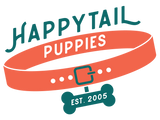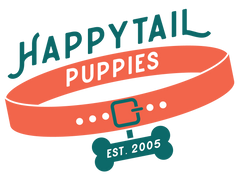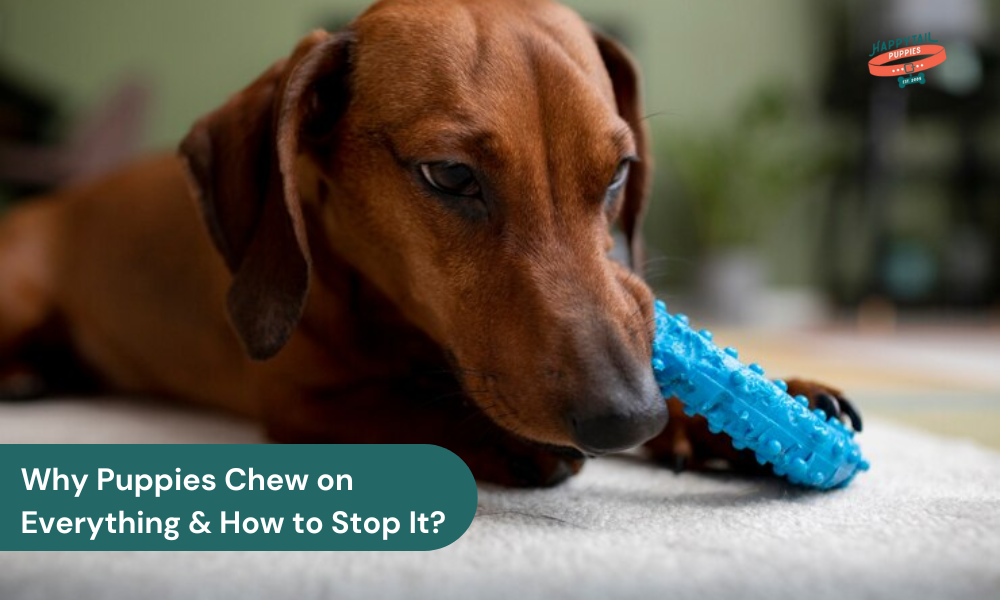Why Do Puppies Chew on Everything and How to Stop It?
Puppies naturally explore the world with their mouths, but excessive chewing can become a problem. Discover the reasons behind this behavior and how to manage it.
It is a natural tendency of puppies to be curious, energetic, and extremely playful. These key traits frequently lead them to chew on anything they would get their paws on. Shoes, electrical cords, and furniture are the most common targets for several puppies. Although chewing is an instinct, chewing excessively becomes a major issue for the pup owners. Knowing the reason why puppies chew on everything and understanding the right measures that can help eradicate this behavior ensures a happier and more peaceful connection with your furry companion.
Understanding Why Puppies Chew
Chewing is often closely related to a puppy's development, and it serves numerous vital purposes. However, chewing excessively can become a huge issue for pet owners. Recognizing the underlying cause behind this type of behavior is the key to effectively managing it, especially if you have small breeds like Chihuahuas, which are known for their playful nature.
Teething and Sore Gums
Identical to a human child, puppies undergo the general phase of teething, especially in their development. It is a general stage taking place between 3 to 6 months of age when the baby teeth fall out and adult teeth start emerging. The erupting adult teeth cause discomfort that drives the puppies to chew on different objects to soothe their irritating gums. Chewing offers much-needed relief from this discomfort. Furthermore, puppies often gnaw on hard surfaces, which aids in loosening up their baby teeth. Appropriate management in this phase is the key to eradicating this instead of creating severe behavioral issues in small dogs.
Exploration and Curiosity
The natural curiosity of the pups makes them explore their immediate surroundings, leaving the pet owners wondering, "Why do puppies bite everything?" Chewing makes them discover the different tastes, textures, and items around them. Similar to the kids who touch and pick up things for learning, the pups use their mouths for similar reasons. Shoes, furniture, and household items become the key targets. It is the behavior that is the important and natural part of their growth process. Offering the pups designated and safe chew toys can keep the pups engaged in their surroundings without leading to any significant damage or entering into any trouble.
Boredom and Lack of Mental Stimulation
When there is a lack of physical or mental stimulation, pups chew to stay occupied. These energetic little companions require regular exercise and engaging activities to stay fulfilled. Lack of stimulation often leads them to chew on household items due to boredom. Incorporating indoor games for dog play, along with basic training and intuitive toys, can help keep the pups mentally engaged and curb their chewing mode.
Anxiety and Stress
Chewing for some dogs like Shih Tzus forms a response to stress or anxiety. Separation anxiety is specifically generic in the puppies who have been adopted or those grappling over being left alone. For the anxious pups chewing is a form of self-calming tendency. This behavior intensifies whenever the pups are left alone or get exposed to stressful situations. Pups who deal with anxiety often chew on things available, including furniture, clothing, and even their paws. Recognizing these critical signs of stress helps in the prevention of long-term damaging behavior due to anxiety.
Energy and Playfulness
Puppies are often filled with a lot of energy, like the Teacup Maltese. Lacking the right modes of outlet often chews for releasing energy. If puppies lack sufficient exercise, they locate alternative ways to ward off that energy. Even playfulness contributes to this chewing tendency. Puppies require a lot of time and exercises to remain engaged, and if these needs are left unfulfilled, then chewing becomes the ideal way to spend their energy. Engaging in fun, active playtime with pups is the key to burning those additional energies and preventing any unwanted chewing.
Lack of Proper Training and Boundaries
Puppies who lack training often chew on everything they find because they do not know what is right. First-time dog owners may fail to understand the real essence of setting boundaries. If a puppy chews on almost anything, the behavior becomes a tough-to-break habit. Teaching pups what is right to chew on is the approach to preventing excessive chewing. Early training helps the pup uncover the difference between household objects and chew toys, preventing long-term bad habits.
The Dangers of Excessive Chewing
Although chewing is considered normal, excessive chewing can lead to severe issues. Knowing about the possible dangers of unmonitored chewing can help pup owners take prompt action to address such behavior.
Destruction of Household Items
Chewing often leads to the damage of personal belongings. Puppies tend to chew on furniture, shoes, and electronics. This leads to financial loss while making the pet owners feel irritated. Cables, furniture, and shoes are a few of the common victims of the chewing habits of the pups. Over time, a home that is filled with chew marks or damaged items creates tension between the pups and their owners, mainly if the behavior is not tackled from the start.

Health Risks and Safety Hazards
Chewing on inappropriate items poses a significant health risk to pups. Rubber, fabric, and plastic cause digestive disorders and choking. Chewing on electrical cords can lead to burns, shock, or other hazardous outcomes. Breaking pieces or sharp objects from dangerous items should be removed immediately. This is the most essential step to prevent injuries or harm while reducing the chances of these life-risking chewing habits from growing.
Tooth Damage
Chewing excessively may also cause harm to the puppy's teeth. Hard objects like bones and rocks cause cracked, chipped, or broken teeth. Damaged teeth lead to significant discomfort that needs costlier dental treatment. Safeguarding the teeth of a pup by preventing excessive chewing upon hard materials is the key to keeping their oral health in optimal condition. The regular inspection of the pup's teeth and gums for damage identifies the potential problems at its onset and ensures that your pup's dental health is at its best.
Effective Solutions for Stopping Destructive Chewing
The effective management of a puppy's chewing tendency needs consistent training and a lot of patience. Luckily, numerous strategies help the pup owners overcome this type of destructive chewing while redirecting it to more managed and balanced behaviors.
Offer Appropriate Chew Toys
Offering your pup the right type of chew toy is one of the effective methods to prevent them from chewing excessively. The chew toys designed for the pups assist in the puppy's urge to chew and soothe the sore gums. Nylon bones, rubber toys, and interactive toys are the perfect options to keep your pups entertained. Chew toys can helps in preventing the pups from chewing upon shoes, furniture and other household items. Choosing the right kind of toys fitting the size of the puppy and their chewing strength ensures that they are enjoying them, avoiding any other inappropriate items to chew on.
Increase Physical Exercise and Mental Stimulation
Prolonging the time for your puppy's exposure to mental stimulation and exercises can curb this habit. Regular walks, games, and playtime like fetch tire out an energetic pup. Intuitive activities like obedience training or puzzle toys engage the minds of pups, preventing any chewing out of boredom. A tired pup is often less likely to chew on household items. Regularly engaging in mental and physical stimulations can help your pup develop into a well-rounded dog, reducing their chewing urge on unwanted items.
Implement Crate Training and Safe Spaces
Another effective way to curb this chewing habit is through crate training for the management of this destructive behavior, especially when you are not here to monitor it. Restricting your pup to the crate or any designated safer space ensures that they gain access to just the safer items to chew upon. Crate training further aids the pups from getting into any trouble whenever they are left unsupervised. With time, pups start to learn to associate the crate with comfort and safety, reducing their destructive chewing urge. Crate training also helps to prevent them from strolling around and finding the items to chew that may otherwise prove dangerous to them.
Use Positive Reinforcement for Good Behavior
Positive reinforcement remains essential for transforming how a puppy responds to chewing activities. After your puppy uses a designated toy for chewing, you should provide either praise, treats, or physical affection as a positive reward. The rewards help establish that appropriate items make desirable targets for chewing. Rewarding good behavior directs puppies to use their toys instead of taking an interest in household items. Repetition of positive rewards will make your puppy realize acceptable behavior standards while building their motivation to continue proper chewing behaviors.
Redirect Attention to Chew Toys
When an owner observes a puppy chewing incident, correct the behavior by offering a suitable chewing toy. Remove the object from the puppy's mouth while providing it with a suitable chewing toy. Regularly offering suitable chewables will enable your puppy to understand which objects it can safely bite. The purpose of redirecting attention is to establish and maintain puppy boundaries so the puppy develops proper behaviors.
Address Anxiety and Stress
The proper treatment for puppy-destructive chewing due to anxiety requires complete stress management. Gradual desensitization helps treat separation anxiety in puppies effectively, although the condition remains widespread among puppies. Begin to separate your puppy briefly before growing the time you stay apart. Pheromone diffusers, along with calming wraps, are useful products to help your puppy feel calm during times of stress. Anxiety that lasts beyond usual panic requires help from either a veterinarian or a professional trainer who will develop appropriate treatment options. Your puppy's emotional needs require attention in order to avoid developing lasting anxiety-related behaviors that involve chewing.
Conclusion
Puppies need to chew naturally, but excessive destructive chewing activities create many different types of problems. Understanding what causes puppies to chew everything enables owners to create more effective behavior solutions. A puppy will engage in destructive chewing because of teething, along with curiosity, boredom, anxiety, and insufficient training. Owners of pets can prevent destructive chewing by incorporating training methods alongside proper exercise routines and selecting suitable chew toys. Through dedicated practice, puppies develop proper chewing habits that protect both their safety and the comfort of those around them.


